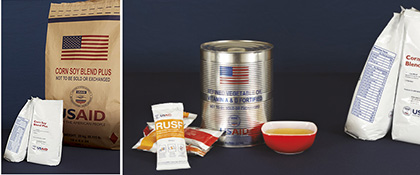Gastropod looks at food through the lens of science and history.
Co-hosts Cynthia Graber and Nicola Twilley serve up a brand new episode every two weeks.
Co-hosts Cynthia Graber and Nicola Twilley serve up a brand new episode every two weeks.
Every December, Band Aid's "Do They Know It's Christmas?" rings out at malls and holiday parties across the U.S. and U.K. But that earworm of a song was actually originally written in response to the devastating famine in Ethiopia in the early 1980s—and it's far from the famine's only legacy. Both the hunger and the relief effort were so enormous that they defined a generation, and forced a major reevaluation of how food aid works. After Ethiopia, many countries decided that handing out cash or vouchers was a cheaper, quicker, and more effective way to feed the hungry, as opposed to literally giving food. Experts began to focus on whether the food itself was the right kind—whether it contained the right mix of nutrients to help malnourished kids recover. And an increasing number of governments refocused their aid efforts exclusively on emergency relief, rather than development.
The U.S., however, remained committed to giving food as aid. This episode, we talk to Barry Riley, author of The Political History of American Food Aid: An Uneasy Benevolence, in order to understand why the U.S. overcame its initial reluctance to feeding the hungry overseas, and explore the impact of its more recent career as the world's largest food aid donor. From surplus grain stored in retired battleships to Cold War maneuvers, America's history has set up its enduring role as the largest provider of food, rather than money. Meanwhile, we check in with seasoned food aid professionals Bea Rogers and Patrick Webb at the Friedman School of Nutrition Science and Policy at Tufts University to investigate what the latest science can tell us about the best way to feed hungry people.

Photo by Vito Aluia for Tufts.
The answers are complex and often counter-intuitive, but they matter more than ever: the world is suffering from both a vast surplus of food, with grains stockpiled in hangars and silos amid a global glut, as well as widespread hunger, with more than a million people at risk of famine. Of course, food aid is just a part of the problem—or the solution—but shouldn't we make sure we're doing it right?
Barry Riley is a visiting scholar at Stanford University's Center on Food Security and the Environment. After decades working in food aid, his new book, The Political History of Food Aid: An Uneasy Benevolence, is a fascinating, if wonky, look at the untold stories and Congressional horse-trading behind America's history as a food aid donor.
Bea Rogers is professor of economics and food policy and director of the Food Policy and Applied Nutrition Program, part of the Tufts University Friedman School of Nutrition Science and Policy.
Patrick Webb is professor of nutrition at the Tufts University Friedman School of Nutrition Science and Policy, and the director of the USAID Feed the Future Nutrition Innovation Lab.
You can read more about the Food Aid Quality Review and its ongoing research lead by the Tufts team here.
For more insight into the body of research examining whether it is more effective to give cash or food to hungry people, and in which circumstances, these studies are a good place to start: the International Food Policy Research Institute's discussion paper, "Costing Alternative Transfer Modalities,"; "Is Cash Better Than Food Aid for Refugees?," an article summarizing research conducted at Tufts University's Fletcher School; and this Oxfam special report on food aid reform.
Click here for a transcript of the show. Please note that the transcript is provided as a courtesy and may contain errors